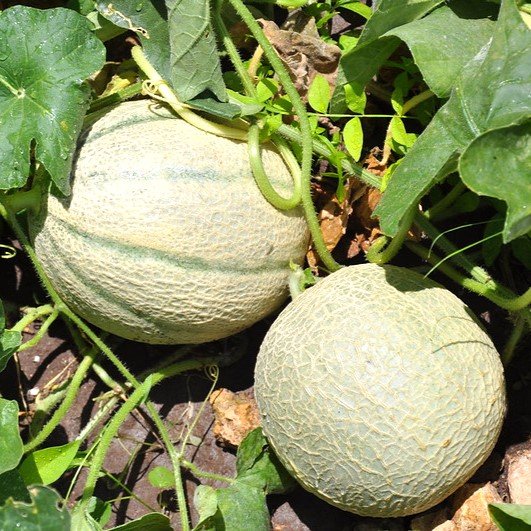Muskmelon (Cucumis melo), commonly known as Kharbooza in India, is a popular summer fruit cherished for its sweet, juicy flesh and refreshing taste. Below are the comprehensive product details for Muskmelon Kharbooza Fruit Seeds:
Botanical Name: Cucumis melo
Common Names: Muskmelon, Kharbooza, Cantaloupe
Fruit Characteristics:
Shape: Round to oval
Color: Ranging from green to yellow-orange when ripe
Size: Typically 1.5 to 2 kg
Flesh: Sweet, juicy, and aromatic with a smooth texture
Seeds: Cream-colored, oval-shaped, and edible
Uses: Consumed fresh, in salads, desserts, or blended into beverages
Plant Characteristics:
Growth Habit: Vining plant with sprawling growth; requires space or support
Leaves: Large, lobed, and hairy
Flowers: Yellow, unisexual; male flowers appear first, followed by female flowers
Pollination: Primarily insect-pollinated; presence of pollinators like bees enhances fruit set
Maturity Period: Approximately 90 to 110 days from sowing to harvest
Yield: High-yielding variety under optimal conditions
Cultivation Details:
Climate: Warm-season crop; sensitive to frost
Soil: Well-drained, fertile loamy soil with a pH of 6.0 to 7.0
Sowing Depth: 1 to 1.5 cm
Spacing: 1.5 to 2 meters between plants; 2 to 3 meters between rows
Sunlight: Requires full sun exposure for optimal growth
Watering: Regular watering to maintain consistent soil moisture; avoid waterlogging
Fertilization: Benefits from organic compost and balanced NPK fertilizers; side-dressing with nitrogen enhances growth
Planting and Harvesting Seasons in India:
North India:
Summer Crop: Sow from February to March
Monsoon Crop: Sow from June to July
South India:
Summer Crop: Sow from January to February
Monsoon Crop: Sow from June to July
Harvesting: Begins approximately 90 to 110 days after sowing; fruits are ready when they emit a sweet aroma and the skin color changes to yellow-orange
Pest and Disease Management:
Common Pests: Aphids, fruit flies, and red pumpkin beetles
Common Diseases: Powdery mildew, downy mildew, and mosaic virus
Management Strategies: Implement crop rotation, use resistant varieties, apply organic or chemical controls as needed, and maintain proper field sanitation
Special Features:
Nutritional Value: Rich in vitamins A and C, potassium, and dietary fiber
Health Benefits: Known for hydrating properties and potential antioxidant effects






















Reviews
There are no reviews yet.